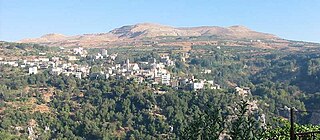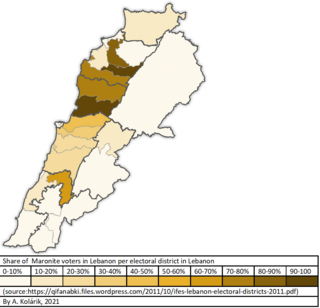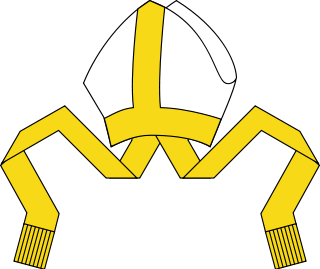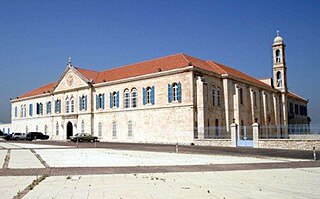
Maron, also called Maroun or Maro, was a 4th-century Syriac Christian hermit monk in the Taurus Mountains whose followers, after his death, founded a religious Christian movement that became known as the Maronite Church, in full communion with the Holy See and the Catholic Church. The religious community which grew from this movement are the modern Maronites.
Basilian may refer to a number of groups who are followers of Saint Basil the Great and specifically to:

Basilian monks are Greek Catholic monks who follow the rule of Basil the Great, bishop of Caesarea (330–379). The term 'Basilian' is typically used only in the Catholic Church to distinguish Greek Catholic monks from other forms of monastic life in the Catholic Church. In the Eastern Orthodox Church, as all monks follow the Rule of Saint Basil, they do not distinguish themselves as 'Basilian'.

The Melkite Catholic Patriarchate of Antioch is the only actual residential Patriarchate of the Melkite Greek Catholic Church. It was formed in 1724 when a portion of the Orthodox Church of Antioch went into communion with Rome, becoming an Eastern Catholic Church, while the rest of the ancient Patriarchate continues in full communion with the rest of the Eastern Orthodox Church.

Kadisha Valley, also romanized as the Qadisha Valley and also known as the Kadisha Gorge or Wadi Kadisha, is a gorge that lies within the Bsharri and Zgharta Districts of the North Governorate of Lebanon. The valley was carved by the Kadisha River, also known as the Nahr Abu Ali when it reaches Tripoli. Kadisha means "Holy" in Aramaic, and the valley is sometimes called the Holy Valley. It has sheltered Christian monastic communities for many centuries. The valley is located at the foot of Mount al-Makmal in northern Lebanon.

The Catholic Church in Lebanon is part of the worldwide Catholic Church under the spiritual leadership of the Pope in Rome.
Anthonians applies to four Catholic Religious communities or Orders and a single Chaldean one, all under the patronage of St. Anthony the Hermit, father of monasticism, or professing to follow his rule.
Gabriel Acacius Coussa, BA was a Syrian prelate of the Melkite Greek Catholic Church who served as Secretary of the Congregation for the Eastern Churches from 1961 to 1962. He was the first Eastern Catholic to hold this position. He was a member of the Basilian Aleppian Order and was created a cardinal in 1962.
Aleppian or Alepian may refer to :
The Mariamite Maronite Order, also called the Aleppians or Halabites, is a monastic order in the Levantine Catholic Maronite Church, which from the beginning has been specifically a monastic Church. The order was founded in 1694 in the Monastery of Mart Moura, Ehden, Lebanon, by three Maronite young men from Aleppo, Syria, under the patronage of Patriarch Estephan Douaihy (1670–1704).
The Antonins, known formally as the Antonin Maronite Order, is a monastic order of pontifical right for men in the Maronite Church. The order was founded on August 15, 1700, in the Monastery of Mar Chaaya, Lebanon, by Maronite Patriarch Gabriel of Blaouza (1704-1705).

Kfarsghab in Zgharta District in the Mount Lebanon Governorate of Lebanon predates Christianity. However, like most villages in the Qadisha valley, Kfarsghab's history began with the settlement of the Maronites in Mount Lebanon during the 10th century. According to the popular tradition, the church of Saint Awtel was built on the ruins of a pagan temple. Pagan temples existed in this region as attested in the Greek inscription mentioning the date 272 AD found in the Mar Mama church in Ehden. Other temples may have existed in the region, such as the monastery of Mar Sarkis and Bakhos in Ehden, which may have been built atop ruins. Given the exceptional location of Saint Awtel's Church built on a promontory, the popular tradition about the existence of a pagan temple in Kfarsghab is plausible.
The Basilian Order of the Most Holy Saviour abbreviated BS, also known as the Basilian Salvatorian Order, is an Eastern Catholic monastic order of Pontifical Right for men of the Greek-Melkite Catholic Church. The name derives from its motherhouse, the Holy Saviour Monastery, at Joun in Chouf near Sidon, Lebanon.
The Basilian Chouerite Order of Saint John the Baptist is a Melkite Greek Catholic monastic order of Pontifical Right for Men. The members of the Order add the nominal B.C after their names to indicate their membership in the Order.
Gabriel II of Blaouza, was the 58th Maronite Patriarch of Antioch from 1704 to his death in 1705.
The Basilian Aleppian Order is a religious order of the Melkite Greek Catholic Church.

Lebanese Maronite Christians refers to Lebanese people who are members of the Maronite Church in Lebanon, the largest Christian denomination in the country. The Lebanese Maronite population is concentrated mainly in Mount Lebanon and East Beirut. They are believed to constitute about 30% of the total population of Lebanon.

Nicolas Antiba is a Syrian archbishop of Melkite Greek Catholic Church. He is the current Patriarchal Vicar of Damascus, Syria.

Joseph Antoine Khawam, BA is a Syrian Catholic prelate who has served as Apostolic Exarch of Venezuela in the Melkite Greek Catholic Church since 2019. He is a member of the Basilian Aleppian Order. He is also Apostolic Administrator of the Melkite Greek Catholic Eparchy of Nuestra Señora del Paraíso in Mexico City.

The Maronite Church is an Eastern Catholic sui iuris particular church in full communion with the pope and the worldwide Catholic Church, with self-governance under the Code of Canons of the Eastern Churches. The head of the Maronite Church is Patriarch Bechara Boutros al-Rahi, who was elected in March 2011 following the resignation of Patriarch Nasrallah Boutros Sfeir. The seat of the Maronite Patriarchate is in Bkerke, northeast of Beirut, Lebanon. Officially known as the Antiochene Syriac Maronite Church, it is part of Syriac Christianity by liturgy and heritage.











